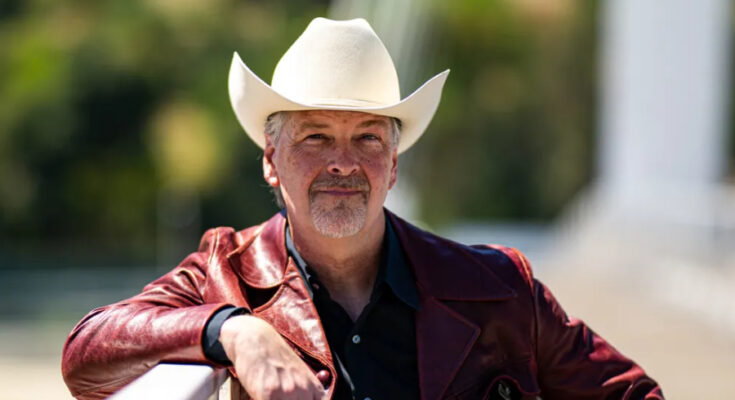Grant Langston, a Californian rooted in the Honky Tonk tradition, is dedicated to the art of songwriting. His signature lies in crafting Southern-inspired, astutely written lyrics, proficiently blending classic honky-tonk country music with contemporary themes. “I’m all rough edges and odd ball lyrics,” he remarks.“Irreverent, loud, and outside the box.”
Originally from Hartselle, AL, Langston made the move to Los Angeles decades ago, yet still honors his Southern roots. “Who I am today as an artist is really about these two places that I’ve lived—Southern California and Alabama. I wanted to try to bring both sides of those influences into this recording and that’s why it’s spelled ‘aLAbama’—my life in LA and Alabama mashed up together.”
aLAbama was also constructed with having fun in mind. “My last solo record was Hope You’re Happy Now, and it was a collection of ballads. Playing those songs live was not the most fun I’ve ever had on stage. I just feel like when I play live the people are saying to me, ‘HELP US FORGET WHAT’S GOING ON IN THIS WORLD!’ I’m ready to help them do that and aLAbama is created with that in mind. It’s a a big, friendly record that gives you a break from the world for 40 minutes. It’s less intense than some of my past work, and easier to just grab a beer and sing along.”
Langston gathered a talented ensemble of Los Angeles musicians for the album, many of whom he has collaborated with and known for several years. aLAbama is a self-produced album recorded across multiple Los Angeles studios, including Los Feliz Sound Machine Studios, The Den (engineered by Ted Russell Kamp in his home studio), Sonic Boom Room (engineered by Kevin Jarvis in his home studio), and Baked Bean Studios (engineered by Dan Wistrom in his home studio). The mixing and mastering for the album were handled by Mark Niemiec at Audiologic Studios in Nashville, TN.
The album features a range of influences, from the Buddy Holly/Rush/Bonanza-inspired track “How Much Do You Want” to the timeless country groove of “Make Your Move.” Tracks like “Layaway” deliver a classic shuffle rhythm, while “As Is Sale” offers a lively, rapid-fire tempo guaranteed to get you on your feet and dancing.
Like most artists, Langston has a “side-gig”. His just happens to be as a CEO of a major company. “For the first 10 years of my time in LA it was a laser focus on music and whatever crummy day job I could find to make ends meet. I played guitar for artists that were showcasing with labels. I played with my own band. I tried to sell songs. I believed in the concept of paying dues and doing every shit job while you earned the right to be successful. The problem was that mentally and emotionally I was feeling worse and worse. I began to realize that I needed a day job that was interesting and gave me energy.” Langston knew a drummer who owned an advertising agency and gave him a job as a copywriter. His ascension in the corporate world started there. Still, Langston has been playing music longer than he’s been running companies.
“All I ever really wanted to be my entire life was a musician. I started my first band at 12, and have been running some kind of musical outfit ever since.It’s easy to think ‘I want to be a guitarist. If I’m successful at something else, then I’ve failed in my goal.’ Every successful musical artist I’ve ever met above the age of 40 has multiple business interests. They may own an apartment building, or be a major investor in a clothing line or recording studio. In case anyone isn’t listening, recorded music produces virtually no income for 99.4% of artists. You have to have as many revenue streams as possible and you have to learn how to manage them. Business is a great teacher of those lessons.”
Music is always at the heart of it for Langston; Four tours of Europe, ten records, solo and band tours around the US, videos and music in TV and Film. Today Langston finds himself a veteran of the scene he’s helped nurture for twenty years. “The artists I respect most are the ones that take an old-school craftsmanship approach to making music. People like Lyle Lovett. He makes records. He tours. He rides whatever fame or attention comes his way, but mostly he develops deep relationships with his fans and they love and support him. I’ve tried to follow this model. There have been twists and turns in the road, but the people that like what I do seem to REALLY like me. They get my wit and my quirky songwriting and they support me.”
He continues, “I have worked hard to have a personae and a handle that makes it easy for people to pick my record up. It’s usually filed under ‘Honky Tonk’ and that’s just fine with me. But people who come with that expectation find I’m doing more than Buck Owens style shuffles. It’s got a wide appeal. Nothing makes me happier than seeing a group of people file into one of my shows who obviously have no connection to traditional country music. Getting them involved and soaking it up means the world to me.”




